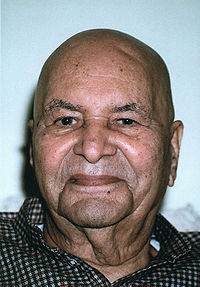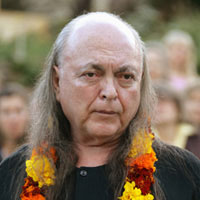|
TRANSLATE THIS ARTICLE
Integral World: Exploring Theories of Everything
An independent forum for a critical discussion of the integral philosophy of Ken Wilber
The Hypnotic Trance of Cults and CultistsConrad Goehausen
This is the dirty secret of virtually all cults and con-men: people want to be tricked and taken advantage of. They like the game, and they like to play it.
At Integral World I came across excerpts from William Yenner's recent book “American Guru”, detailing the sordid history of Andrew Cohen's spiritual community. Yenner is apparently getting a lot of heat from current members of Cohen's group, as well as some former members who have branched out and become teachers in their own right. I've read some accounts of former member's of Cohen's group before, and nothing Yenner says about them surprises me in the least. I can certainly relate to a good deal of Yenner's disappointment that spiritual groups would have such a hard time dealing with basic issues of fact, considering my own experience in Adidam, which Cohen incidentally was a member of for a brief period shortly before becoming a Guru himself. 
Yenner describes how the criticism he gets from these folks generally deflects questions of outright veracity of the basic facts of Cohen's abusiveness with the accusation that Yenner is not providing the proper spiritual "context" for what should be viewed as Cohen's “crazy wisdom” - again, a term and concept Cohen picked up from Adi Da, who of course used the same rationale for many years to justify his own oftentimes abusive teaching methods. I'm familiar with that defense as well in my dealings with Adidam devotees. In a recent online exchange following Adi Da's death with some current and former members of Adidam, I encountered a similar problem. When devotees disputed some factual accusation made against Adi Da, I usually asked them to simply describe what had actually gone on in Adidam, putting all the facts out on the table, and let us all decide for ourselves how to deal with those facts. This was universally rejected by devotees, who time and again explained that only those who “recognize” Adi Da could be given access to these facts, and even then only as their “maturity” warranted. This kind of logic is of course very familiar to anyone who has examined the psychology of cults. Cults create an internal structure of self-protection which is, if examined dispassionately, precisely how the ego defends itself from the attacks it sees coming at it from all sides. In a certain sense cults simply operate as any ego does, constructing internal forms of logic and self-justification for whatever it needs to do to survive and prosper. The ego tries to be very thorough in creating its own internal world, and is immune to outside criticism from those who don't understand the “context” of the ego's rationalizations. The only difference is that in religious cults, the ego wraps itself in the holy shrouds of Divinity, and equates any criticism of its core beliefs with criticism of the universal God. It's interesting in a strictly anthropological sense to see how this dynamic came into being in Cohen's world. In some respects, it's almost a duplication of the Adidam model, and that shouldn't be surprising given Cohen's own previous involvement in Adidam. I didn't know Cohen when he was involved. I at best saw his face a few times at gatherings. He only lasted a year and a half, and left dissatisfied, I was told, with the lack of recognition of his own spiritual maturity he received from others in Adidam, and his own desire to be like Da, a Guru in his own right. Certainly some of these impressions of Cohen from people who knew him in Adidam were motivated by Cohen's rejection of Adidam. But it also seemed accurate enough in its own way. Cohen clearly was someone who had a desire to be a Guru, and he never would have lasted in Adidam, given its proclivity for suppression and sublimation of those kinds of desires. Cohen left Adidam to go to India to meet Poonja Swami, known as Papaji, who at the time was just becoming well-known to westerners. Eli Jaxon-Bear and Gangaji had just come back to Marin County from visiting Papaji in Luchnow, and Gangaji was declaring herself an enlightened Jnani, and beginning to teach in her own right. Cohen who had been living in the Adidam Marin community, apparently met Gangaji, was both impressed and inspired, and quickly traveled to India to meet Papaji himself. He stayed for five weeks, during which time Papaji gave him all kinds of spontaneous spiritual experiences, and heaped all kinds of praise upon him, which he was doing with many other people at the time. As with Gangaji, he told Cohen to go back to the US and tell people about what was happening in Luchnow, to spread his Satsang, and make it available for others.  H. W. L. Poonja When Cohen returned to the US, however, he almost immediately began to proclaim himself an enlightened teacher of the highest degree, comparable to Ramana Maharshi and Papaji (who was a direct devotee of Ramana). In some sense this was not unexpected. Papaji had certainly been telling Cohen, and many others, that they were all fully enlightened. And some, like Cohen, actually believed it and ran with it. Later, Papaji said of this period that it was all basically a test to see who would take these kinds of spiritual awakenings for the ego, and who would surrender them. A year later, Cohen came back to visit Papaji, presuming that he would be welcomed with praise for his good work. Instead, Papaji explained to Cohen that he was completely deluded, that he had misunderstood and misused everything Papaji had given him, that he was not a Guru and had no capacity to teach at all, and that he should give it all up. Cohen of course refused to believe Papaji, and finally rejected him and declared that Papaji was mistaken, and that if there was any testing going on, it was to see if Cohen would reject his own enlightenment. Cohen chose to retain his “enlightenment”, and instead severed his ties to Papaji, who warned him that he would be creating severe consequences for himself and his students by doing so. Apparently many ugly words were exchanged between the two, and a great deal of bad blood ensured. Of course, other Papaji devotees made similar choices, including Gangaji and her husband Eli Jaxon-Bear. They did not become hostile as Cohen did, but they did not accept Papaji's assessment that they too, like all the others who had believed in their own enlightenment, were essentially deluded and unqualified to teach others. In fact, many Papaji devotees came away from Luchnow convinced that they were enlightened and began making the rounds of the spiritual circuit. The entire enterprise became infamous, and spawned several generations of what has often been hilariously referred to as “Advaitic micro-gurus”. Most of these “micro-gurus” had very little staying power, and tiny audiences. Only a few had the charisma to carry on for long, and to attract enough loyal followers to sustain themselves financially and create actual communities around them. Gangaji and Saxon-Bear were fairly successful in the lucrative Marin county spiritual circuit, enough to live in a nice home and have all the accountrements of successful Marin county businesspeople. That being a Guru was the business they were in was perhaps incidental to the lifestyle, but it was an odd way to make a living, considering that their legitimacy was derived from Papaji, who was famous for refusing all financial support, and refusing any ashrams or formal spiritual communities, but warning against them repeatedly. He repeatedly taught that any spiritual teacher who charges money for their Darshan and instruction was a fraud, with no exceptions. He learned this by example from Ramana Maharshi, who would never allow people to solicit money in his name. 
Gangaji Gangaji found a fairly sizable following of people who considered her the “real deal”. I lived in Marin at the time, and I knew of her, but I could never take her very seriously. No one I met who was impressed by her struck me as impressive themselves, even by Adidam standards. It seemed the sort of thing that required very naïve and needy people—again, even by Adidam standards. Of course, it's funny how people in cults can recognize people in other cults as nutty, but seldom do they see themselves and others in their own cult that way. Even so, one couldn't help but notice that the people attracted to both Gangaji and Cohen were not exactly of the highest caliber. Even so, Gangaji's students were at least seemingly decent people, and even Gangaji herself and Eli Jaxon-Bear seemed like fairly honorable people, if self-deluded. In recent years, the Gangaji organization was scandalized by the revelation that Eli had been having an affair with another women in their community, and this led to all kinds of questions being raised about his “enlightenment” and the ethics of their whole operation. It wasn't helped by the stonewalling of questions about what was going on, and then an expensive “retreat” in which people were charged lots of money to sit down and work through their reactions to this news. A few months ago I caught an interview with Eli on NPR, in which he freely admitted to the affair, to handling the whole situation badly, to hurting a lot of people, and to learning many lessons from it all. However, he defended the notion of his own enlightenment, and said instead that it merely showed that even enlightened people make mistakes. His definition of “enlightenment” seemed a little vague and even malleable, but I gather it was designed in such a way as to always include his own self-image, regardless of whatever he managed to do along the way. For him, enlightenment is a question of knowledge, of knowing who you are, and since Eli feels that he knows that he's eternal Brahman, that makes him enlightened, even if he still has trouble with his weenie. The notion that enlightenment involves not only knowledge, but the relinquishment of desires and vasanas, the tendencies of mind, seems foreign to him, and very inconvenient, so he doesn't bother addressing such things. Which is how most of these types get by. Eli's not a bad guy at all. He seems pretty likable, actually. He's not the ferocious egomaniacal Guru type. He's just deluded and entrepreneurial. I'm sure he feels that he helped people out and was justified in charging high rates for his help. Psychiatrists, after all, get paid quite well for therapy that is also often of dubious value. Being in a cult definitely has value to many people, and they are willing to pay for it. This is part of the human condition, like the sex trade, or even traditional marriage (by which I mean, wife as chattel). Calling it what it is shouldn't be a matter of controversy, except to the degree that the trade depends on not calling it what is is, but on pretending it's something other than what it is. Even so, Eli and Gangaji are by nature softies, as were most of Papaji's devotees, delusional or not. It should be mentioned, of course, that most of Papaji's devotees were not delusional, and did not set themselves up as Gurus in their own right. Most of what Papaji taught seems to have been properly understood as a goad to awakening, rather than as a badge to be worn on one's breastplate. Andrew Cohen turned out to be the most hardcore of the former Papaji devotees. He believed the most deeply in his own perfected realization, and was the most aggressive in promoting it and foisting it upon those around him. One can only speculate as to why this is so. I would gather that it was simply his own character coming through. Whether or not he had met Papaji, I suspect he was determined to become a Guru, and it would have come out one way or another soon enough. I know Papaji has received a lot of criticism for his involvement with Cohen, and some have even blamed him for creating the Cohen monster, but my own suspicion, based on nothing at all personal but merely on my own understanding of human nature, is that if anything, Papaji probably had some moderating effect on Cohen's inevitable Guruship. What Cohen might have become without the influence of someone like Papaji is perhaps not so pleasant to consider.  Adi Da Even so, what Cohen became is in many respects more attributable to his experience in Adidam than with Papaji. Papaji, after all, openly rejected virtually all the teaching precepts which Cohen came to embrace, from “crazy wisdom” to the value of abusive behavior to financial demands on devotees, to a complex organizational structure and hierarchy centered upon the Guru, etc. All these things, on the other hand, can be found in Adidam in spades. Reading about Cohen's organization is very much like reading about life in Adidam, with its own peculiar twists. The general picture, however, is very much the same. Cults are relatively monotonously similar in their structure and methods, if the details always manage to vary. The names and beliefs change, but the structure and activity remain the same across the board. I recently came across another board in Yahoo groups dedicated to ex-members of Ammachi's organization. I was surprised to see that similar cultic patterns are present in her community, especially since I had a generally favorable view of her. I'd seen her just once, right after leaving Adidam, got that hug, and generally felt a strong, positive spiritual influence from her. I could see the obvious signs of devotional cultism around her, but I guess compared to Adidam it actually seemed not so bad. At least the people around her were dedicated to making her available to the public, rather than hiding her behind a cocoon. And yet, reading through some of these accounts, it appears that there was and is much ugliness within her organization, and she seems indifferent to it and doesn't care to take responsibility for it. One gets the sense of some who has some great and powerful spiritual qualities and power, and yet who has fallen into the trap of identifying with an archetype, rather than surrendering all that in God. There seems to be a basic misunderstanding that realizing God means that you become God. This is simply not true. Realizing God means eternally surrendering to God, and becoming nothing at all. God is not a thing one becomes, but a living consciousness one surrenders oneself to. That principle is utter unity, oneness, non-separateness, total equality. Thus, the realizer lives as the equal of all, not as someone above and beyond everyone else. This is how Ramana lived, how Papaji, Nisargadatta, Buddha, Jesus, and others like them lived. However, there is a group of advanced spiritual types who fall short of complete and final realization, and one of the reasons they fall short is that they begin to identify with profound and universal spiritual archetypes. Adi Da identified with the “Avatar” archetype, as did Meher Baba. Ammachi identifies with Kali, and the universal Female Energy, and Cohen evidently identifies with "crazy wisdom". I'm sure they all have decent enough reasons to feel these are valid self-descriptions. I am sure they were accompanied by profound yogic experiences that led these archetypes to dominate their psyches. I'm merely suggesting that it's the sign of an incomplete realization, and a mistake that keeps such people back, not a sign of a more profound realization that we should either desire, emulate, or worship. To do so creates a co-dependent narcissistic relationship, in which we are encouraging and even profiting from their mental instability, just as the crowd at a rock concert feeds on the precarious narcissism of the self-destructive front-man.  Ramana Maharshi Ramana used to say that many people reach a level of spiritual understanding that feels like enlightenment, and that very few ever go further than this. I'd gather that there are various kinds of false enlightenment, not just one type, and that one can see the examples of it in many of these characters. Andrew Cohen seems to have a pretty low level of this “enlightenment”, but clearly it was sufficient for him. Adi Da achieved a much higher level of spiritual greatness, as did Ammachi, but they still seem to have fallen short, and turned their spiritual achievement into something that in some respects can actually work against their own enlightenment and that of others. One can still make use of such people, but one has to be very wary of their dark side, their ego, which is still alive and kicking, and unfortunately, completely unconscious in these types, but present only in their identification with Divine archetypes, which enable a much wider range of co-dependencies among devotees. One thing that can be said in general about all positive spiritual pursuits is that they require a direct inspection of the ego. In fact, the most positive of all spiritual pursuits is, paradoxically, just that: the direct inspection of the ego, such that one never takes one's eye off it. In any spiritual endeavor, the best recommendation is to be aware of one's own ego and its various tricks, for if one does so, one will never be entirely taken in by the egos of others. For one, you will simply recognize the smell and taste of the ego in what others do, and second, you will simply not be inclined to go down those paths. Unfortunately, most of us are not terribly self-aware, and we all tend to fall into paths that are blind to their own ego, and which blind us as well. Cultic indoctrination has often been compared to “brainwashing”, as if it is something that is imposed upon us from without. But there is no such thing as “classic” brainwashing in that sense, at least without total physical control such as one might find in a POW camp. What is commonly referred to as cultic brainwashing is something much subtler and more sophisticated than that. It's more akin to hypnosis, which is also not what people tend to think. Practitioners of hypnosis and scientific investigators of the phenomena all agree: there is actually no such thing as “hypnosis”. In other words, the hypnotic trance is not really a trance at all. It's a state of voluntary submission to a charismatic leader, the hypnotist, so that the ego of the one in the “trance” can live out various fantasies without taking any responsibility for them. The ego merely tricks itself into thinking it's in a trance, when in fact it is merely going along for the ride, participating in an exercise of play-acting, because it wants to. This is the dirty secret of virtually all cults and con-men: people want to be tricked and taken advantage of. They like the game, and they like to play it, and they go along because it serves the ego's purpose. Now, the ego's purpose might not be good for us, and in fact it seldom is, but we can't pretend that we didn't follow our own ego's prerogative to join a cult and submit to its games, unwittingly or unwillingly. We join cults for very good reasons, if we examine ourselves honestly. And this is why cults can be so successful and so long-lasting. It's also why it's hard to get around the defense most cults make that people joined willingly and not against their will—because it's true. That doesn't make it any less disgusting, but it does make it a morally complex situation, and not just a simplistic question of innocent people being hoodwinked by a conman. As any conman will tell you, people's desire to be fooled is the essential ingredient to any con. Without it, no one can be conned. And without people who want to join a cult, cults would not exist either. They are very much like the people who volunteer at a hypnotist's show. They want to be hypnotized. They want to fall into a daze and be led to do crazy things and enjoy themselves doing that, without having to take any conscious responsibility for it all. The cult leader understands this, because he too wants to live in a trance. His trance is called “believing in one's own enlightenment”. He becomes the hypnotist who is his own first subject. The others fall in line with the hypnotist's message, and they become willing participants in the drama he creates. Not everyone, of course, has the same fantasies they want to live out. But fortunately there are a wide number of cults each with a slightly different fantasy, and there's enough of them to suit almost anyone. Andrew Cohen created a fantasy world for himself that was able to attract enough willing followers to survive and even thrive in small-pond style for quite some time. Adi Da was more successful, and Ammachi more successful still. Some of their devotees eventually fell out of the self-induced trance, but often conveniently forget that they themselves were responsible for their own trance state, and for what they did while under the trance. It was never really a real trance, after all. It was a self-induced state, created not by the hypnotist/cult leader, but by the cult follower themselves. This doesn't relieve the cult leader of their responsibility either, it merely makes it clear that they were never the one with the power at all, it was the cult follower all along whose own bizarre desires and fantasies led to this game being played out. Even the conflict and cognitive dissonance are those of the cultist, not the leader. They are not actually transferred or transmitted, they are merely duplicated because it fulfills a fantasy.  Jim Jones Even the Jonestown massacre was not entirely Jim Jones' creation. Many of those who were attracted to him in the first place shared his macabre and death-loving character, which had those kinds of overtones all along. On the other hand, not everyone there was actually desirous of playing out the suicide game. Many were there to play out the murder game, and when that terrible day came to pass, those who opted out of the suicide trance were captured and killed by those in the murder trance. We should be reminded that those who committed those acts of murder were doing so not just out of their own free will, but out of their own murderous fantasies. They might try to blame Jones for their crimes, but like the Nazis who were “just following orders”, they were willing participants who enjoyed that horrifying game. Andrew Cohen was a far cry from Jim Jones, of course. His submission games had a definite sado-masochistic side to them, as did some of the Adidam ones. But sado-masochism is not as rare as many of us would like to think. It's actually a fairly common fantasy, that some people seek out through one cult or another, or even just one bad relationship or another. It would be nice if we could blame cultism only on these insidious cult leaders, but they are not really the main problem. The problem with Nazism wasn't Hitler, it was the Nazis themselves, big and small, who were all too eager to play out a crazed and glorious fantasy. As Freud said, the pattern of these kinds of social groupings is always the same, At the center is a charismatic narcissist who “gives permission” to the narcissism of others to come out of its hiding place. This is the pattern of many rock stars, who give the audience permission to exploit themselves once the star puts out the “word”. The party begins, and everyone's private narcissistic fantasy is given expression. A cult is very much like that, sometimes even with the music, sex, and drugs thrown in. As Papaji used to say, there are no bad gurus, only bad devotees. The way to end cultism, in other words, is not about learning to recognize bad gurus, but by learning to recognize one's own narcissistic fantasies, and stop pretending when we live them out that we were not responsible for ourselves. This isn't a way of excusing cults, it's a way of ending them. If we come to terms with our own narcissism, our own desire to live it out surreptitiously through the “permission” of a narcissistic cult leader, we can't exploit the cult experience, or find ourselves “exploited” in the process. Cults will die out only when people face up to their own desire to fall into a “trance” that relieves them of responsibility for their own fantasies. It's not a question of guarding people from cult leaders, but of helping them to consciously face their own inner fantasy life consciously and go beyond it. This in no way calls for a re-evaluation of cult leaders that excuses them for their criminality or manipulation of others. The narcissism they play upon in others is merely a reflection of themselves. Their own sense of victimization at the hands of their devotees, past and present, is merely the flip side of those devotees who feel victimized by the cult leader. Both are playing out the same sado-masochistic fantasy, and trying to profit from it. In the end, no one but the ego actually profits. The problem there, of course, is that the ego thrives on suffering, not on happiness, and so the outcomes reached in most such cases are rather miserable, depending on just how far one took the fantasy. One is left in the end only with a spiritualized ego, and that is not nearly as much fun as our fantasies would have us believe. This is true of the leaders as much as the followers. Cults are generally boring places of inner misery camouflaged by righteous ideals. So there's no need to unduly “target” fellows like Andrew Cohen or Adi Da. That is just part of the fantasy relationship as well. It's best merely to see them as they are, and see ourselves as we are, and understand that we went along with their trance-state for reasons of our own, and if we leave it, we have to understand that the desire to live in a trance is a universal one. We don't leave that behind merely by leaving one particular cult. We have to leave our own ego's fantasy life behind to do that. Or at least not let it be unconscious in us, such that it takes us by surprise. If we want to live out our fantasies, we should do so consciously, and know what we are getting into. And maybe if we become more conscious of it, we won't want to indulge it anyway. Consciousness of our own fantasies tends to dissipate the unconscious power of the fantasy, loosening its hold on us. This is why consciously examining the ego undoes much of its grip. The principle of the ego is unconsciousness itself, which the hypnotic trance of the cult extends rather than undoes. Whereas the power of conscious awareness makes conscious what is unconscious in us, and thus frees us from its compulsive necessity. I'll probably write some more about this topic in the coming days, as well as discussing its opposite: the free life, and the emerging spiritual model of the un-cult.
|

 Conrad Goehausen is webmaster of the blogs
Conrad Goehausen is webmaster of the blogs